 Credit: Ievgenii Karanov, Chronicle.lu
Credit: Ievgenii Karanov, Chronicle.lu
On Thursday 23 October 2025, Luxembourg's Minister of the Economy, SMEs, Energy and Tourism, Lex Delles, and the Minister of Mobility and Public Works, Yuriko Backes, presented Luxembourg’s national strategy for automated driving.
In line with the coalition agreement, the “Automatiséiert Fueren 2028” strategy sets out the government’s ambition to make Luxembourg the first European country to enable the deployment of automated driving on its territory by 2028, positioning the Grand Duchy as a laboratory for the mobility of the future.
In an interview with Chronicle.lu, Minister Backes explained that Luxembourg aims to position itself at the forefront of automated driving in Europe. “We want to be a pioneer in this area. There is no EU regulation in place for autonomous driving, so countries are developing this on their own for the moment. We have been experimenting in Luxembourg for a while now and have had very positive feedback from these experiments,” she said.
She added that the government is now preparing a legal framework to support further development. “Five specific use cases will be included - autonomous driving on highways, robotaxis, valet parking, last-mile driving and logistics,” she said. “Current pilot projects cover automation levels one and two, but with this framework we want to move towards levels three and four. Level five, which represents full autonomy, would come at a later experimental phase.”
The minister, who grants authorisations for pilot projects, highlighted that autonomous public transport testing is already taking place in Esch-sur-Alzette and Esch-Belval. “I’m very happy to promote such initiatives on a case-by-case basis so that we can have more pilot projects,” she said, noting that the draft law could be in place by 2027.
According to the Ministry of the Economy and the Ministry of Mobility and Public Works, the strategy forms part of Luxembourg’s wider transformation agenda focused on innovation, sustainability and competitiveness. It aims to establish a digital and innovation ecosystem with a strong experimental capacity and a culture of cross-sectoral cooperation, positioning automated driving as a driver for job creation and improved quality of life within a multimodal mobility policy.
Aligned with the strategic initiative “Accelerating Technological Sovereignty 2030”, the plan identifies six key areas of action: establishing a regulatory framework, strengthening skills and talent, supporting businesses and innovation ecosystems, and enhancing international cooperation. An interministerial steering committee will oversee implementation to ensure a coherent, cross-sectoral approach.
“This strategy aims to make Luxembourg a pioneer in automated driving,” said Minister Delles. “It relies on dedicated programmes, living laboratories and test environments that will facilitate innovation and the validation of technologies: from closed sites to real-world deployment. It also focuses on developing skills and strengthening synergies between research, industry and innovative start-ups.”
The Ministry of Mobility and Public Works plans to submit a draft law in the coming months to support the gradual rollout of the five priority use cases by 2027: robotaxis, last-mile automated shuttles, valet parking in restricted environments, automation in logistics, and driver-assisted systems for safer motorway travel.








